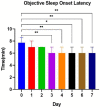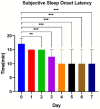Effect of sleep ambient music on sleep quality and mental health in college students: a self-controlled study
- PMID: 37484105
- PMCID: PMC10361298
- DOI: 10.3389/fpsyg.2023.1171939
Effect of sleep ambient music on sleep quality and mental health in college students: a self-controlled study
Abstract
To verify the effect of sleep ambient music intervention (SAMI) on sleep quality and mental status of college students, and to further explore the minimum effective duration of SAMI, this study was designed as a pre-and post-intervention self-controlled exploratory study. Participants were subjected to a one-week no-intervention test, then 4 weeks of music intervention followed. Subjective sleep quality data were collected using the Pittsburgh Sleep Quality Index (PSQI); objective sleep quality data were collected with Actigraphy; and mental status data were collected using the State-Trait Anxiety Inventory (STAI) and the Beck Depression Inventory-II (BDI-II). Data were analyzed and processed using mixed-effects models and repeated measures. The results showed that compared with the no-intervention week, college students' subjective sleep quality, objective sleep onset latency (SOL), trait anxiety, and depression symptom were reduced at week 1; week 2; week 3; week 4 under SAMI; state anxiety of college students at week 3 and week 4 under SAMI were also reduced. And there were differences in sleep quality among college students of different genders too. Compared with females, males had worse sleep efficiency (SE), shorter total sleep time (TST), and more awaking times (AT). In addition, 3 days was the minimum effective length for SAMI to shorten objective SOL, and 2 days was the minimum effective length to shorten the subjective SOL of college students. The findings of this study suggest that SAMI can improve subjective sleep quality, shorten objective SOL, and reduce anxiety and depression in college students. Interventions for more than 3 days had a significant effect on shortening SOL and long-term effects seemed to emerge after 3 weeks.
Keywords: anxiety; college students; depression; metal health; music intervention; sleep ambient music; sleep quality.
Copyright © 2023 Hu, Yang, Chen, Lu, Niu, Xia and Li.
Conflict of interest statement
The authors declare that the research was conducted in the absence of any commercial or financial relationships that could be construed as a potential conflict of interest.
Figures



Similar articles
-
Association of depression symptoms and sleep quality with state-trait anxiety in medical university students in Anhui Province, China: a mediation analysis.BMC Med Educ. 2022 Aug 19;22(1):627. doi: 10.1186/s12909-022-03683-2. BMC Med Educ. 2022. PMID: 35982434 Free PMC article.
-
Relationship of smartphone use at night with sleep quality and psychological well-being among healthy students: A pilot study.Sleep Health. 2020 Aug;6(4):495-497. doi: 10.1016/j.sleh.2020.01.011. Epub 2020 Apr 24. Sleep Health. 2020. PMID: 32336603
-
Prescribing laughter to ameliorate mental health, sleep, and wellbeing in university students: A protocol for a feasibility study of a randomised controlled trial.Contemp Clin Trials Commun. 2020 Nov 26;20:100676. doi: 10.1016/j.conctc.2020.100676. eCollection 2020 Dec. Contemp Clin Trials Commun. 2020. PMID: 33305066 Free PMC article.
-
Digitally-delivered cognitive-behavioural therapy for youth insomnia: A systematic review.Internet Interv. 2018 Feb 7;11:71-78. doi: 10.1016/j.invent.2018.01.007. eCollection 2018 Mar. Internet Interv. 2018. PMID: 30135762 Free PMC article. Review.
-
Novel Augmentation Strategies in Major Depression.Dan Med J. 2017 Apr;64(4):B5338. Dan Med J. 2017. PMID: 28385173 Review.
Cited by
-
Treatments and regulatory mechanisms of acoustic stimuli on mood disorders and neurological diseases.Front Neurosci. 2024 Jan 5;17:1322486. doi: 10.3389/fnins.2023.1322486. eCollection 2023. Front Neurosci. 2024. PMID: 38249579 Free PMC article. Review.
References
-
- Becker S. P., Jarrett M. A., Luebbe A. M., Garner A. A., Burns G. L., Kofler M. J. (2018). Sleep in a large, multi-university sample of college students: sleep problem prevalence, sex differences, and mental health correlates. Sleep Health 4, 174–181. doi: 10.1016/j.sleh.2018.01.001, PMID: - DOI - PMC - PubMed
LinkOut - more resources
Full Text Sources

